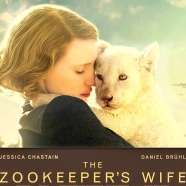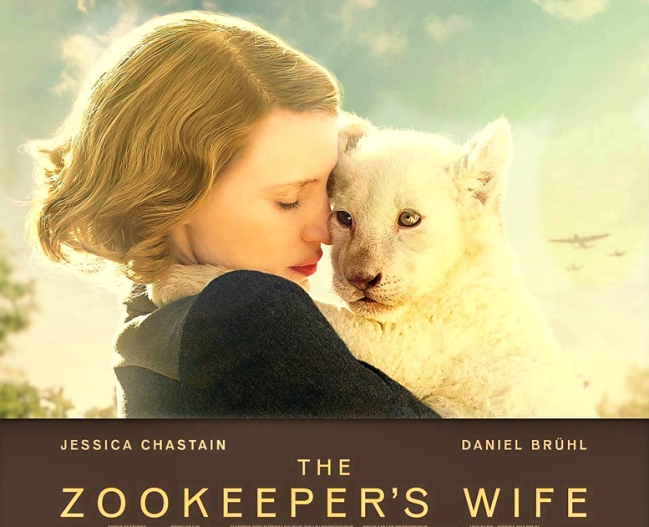 May
11
May
11
Tags
The Zookeeper’s Wife (2016)

The diversity of Holocaust-themed movies has increased over recent years as filmmakers try different storytelling approaches to keep alive our collective memory of what happened. One film that has divided the critics is The Zoo Keeper’s Wife (2016). While most of this genre uses graphic realism to confront large-scale human carnage and moral dystopia, this beautifully filmed story tells how 300 Jewish lives were saved by the owners of the Warsaw Zoo.
The film opens in 1939 with stunning photography of an idyllic existence in the charming Warsaw Zoo. Owners Antonina (Jessica Chastain) and Jan (Johan Heldenbergh) are devoted zoologists who love their animals and each other. There are many touching scenes of physical affection that portray trust and understanding across the human-animal divide. The peace is soon shattered by Nazi bombing and there are many disturbing scenes of animal destruction. Soon after the Nazis arrive, the Zoo’s best breeding specimens are sent to Berlin under Hitler’s zoologist Lutz Heck (Daniel Brühl). With Nazi soldiers needing housing, the Zoo is under threat but saved when Antonina obtains Heck’s support to convert it into a pig farm to feed Nazi soldiers. He becomes a frequent visitor to the Zoo and his sexual overtures towards Antonina means she must keep him charmed to save the Zoo. As the atrocities against Polish Jews escalate, Antonina and Jan hatch a plan to use garbage trucks to smuggle Jews from the Warsaw Ghetto to freedom via Zoo tunnels. The story focuses on the dangers of hiding the Jews and the horror facing those who are loaded into cattle-trucks for transportation to Hitler’s Final Solution.
The critical ambivalence towards this film dwells on its aesthetic treatment of the opening scenes and what some argue is Chastain’s saintly characterisation of Antonina. While the cinematography is superb from beginning to end, it does adopt an excessively sugary style in the pre-Nazi-occupation part of the story. The opening scenes of Antonina cycling through the zoo, personally greeting the caged and free-roaming animals, smiling and waving to all of humanity, are both beautiful but incongruous for the story we know is about to unfold. From the extraordinary scenes of Antonina saving a new-born elephant in front of its distressed parents to the harrowing escape scenes, the film almost deifies the heroine for her goodness towards others. But these are directing issues rather than acting. Chastain’s performance is excellent across the range of emotions she portrays and she is a glowing beacon of light in a film that could easily have been depressingly bleak.
The Zoo Keepers Wife is a worthy addition to an honourable genre that includes the multi-award winning Schindler’s List (1993). It communicates the larger Holocaust narrative while keeping its carnage and dystopia off-screen. In an age of audience desensitisation, it is ironic that viewers can be emotionally touched more deeply by the death of animals than humans. This is a story of courage and triumph, told from a woman’s viewpoint, with top-tier production values in filming, acting, and narrative. It is also an important part of Polish history. Antonina and Jan were decorated as national heroes and the re-built Warsaw Zoo still stands as a legacy to their achievements.

Director: Niki Caro
Stars: Jessica Chastain, Johan Heldenbergh, Daniel Brühl
A Czech Republic, UK and USA production

I’m glad you reviewed this. I read the book and felt that was enough. I fear I wouldn’t make it through those scenes of animal destruction.
LikeLiked by 1 person
Its worth seeing if you can; I found it quite moving and went through several tissues.
LikeLike
Maybe on the small screen…:-0
LikeLiked by 1 person
Pingback: The Zookeeper’s Wife (2016) | CineMuseFilms | Rogues & Vagabonds